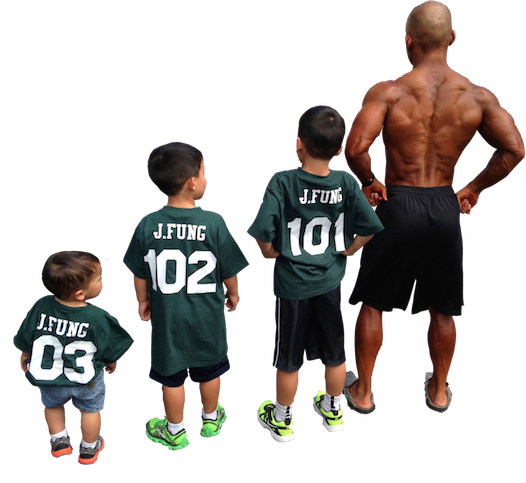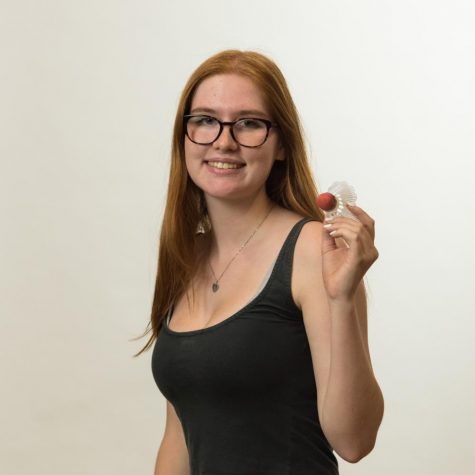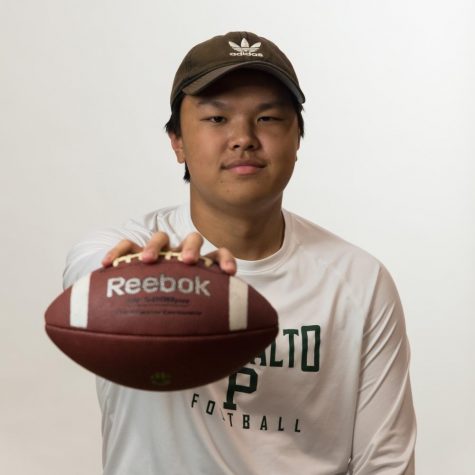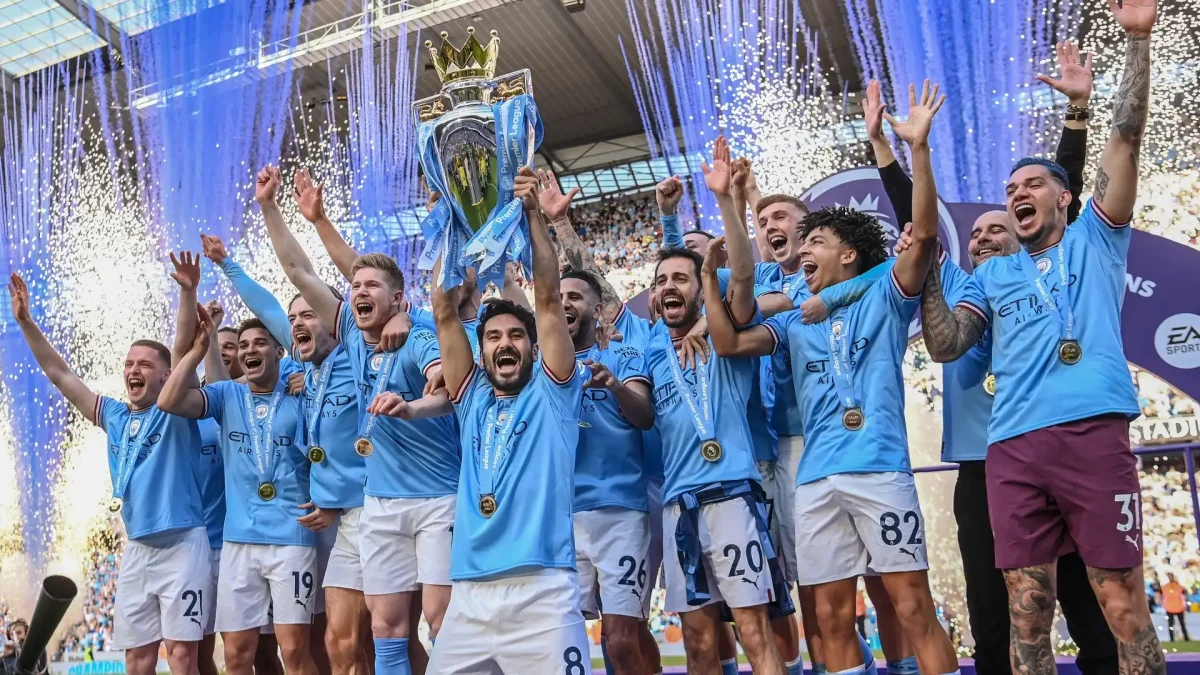Champion
Jason Fung’s presence is felt in all reaches of the Paly community, though few know the winding path he took to get here. From his unprecedented bodybuilding success to his endless advocation for students, Fung has shown his true character: the people’s champion.

April 11, 2019
If you didn’t know any better, you might think it was Mary Poppins’ bag. After all, the supply of treasures within it appeared endless, and for a mid-sized, seemingly demure black bag, it reached surprising depths. Once a hand went into it, it would invariably spend a few seconds jostling around, encountering almost as many obscure items as the mythical nanny; where Poppins filled hers to the brim with an apron, hairpins, medicine, an armchair, blankets, even an entire duvet, this one is equipped with what could also easily be mistaken for an apocalypse survival kit. Several meals, carefully confined within the walls of Tupperware containers, form the foundational base of the bag. They host, invariably, one-half cup brown rice, 6 ounces boiled chicken with no seasoning, 1 cup broccoli. Substitutions are limited to sweet potatoes for brown rice, white fish for chicken, and spinach for broccoli. It’s enough food to last a week if consumed at a normal pace. It could stretch a few weeks, if rationed carefully. The middle features the absolute necessities: an assortment of supplements with names that could strike fear in the heart of even the most fearless organic mothers among them, and pre-workouts with promises of reduced facial jitters and explosive muscle pumps (which are surprisingly listed as a selling point, and not as a condition that should prompt the immediate attention of a medical professional). Completing the pyramid of supplies is a familiar face: bottles on bottles of water, both for pure intake and for mixing with the aforementioned supplements to form brightly-colored neon concoctions reminiscent of Mary Poppins’ own dark red medicine bottle, but turned up to 11.
The bag, of course, doesn’t belong to Poppins at all. But it, just as it had for Poppins, accompanied its owner wherever he went. For Jason Fung, it was more than an eclectic mixture stored in a small black bag. It was his own never-ending toolbox.
“Everywhere I went, I had a bag on me,” Fung said. “I had water, I had food – you always want to eat. And the joke was, every time my watch went off in practice, coach Duran would be like, ‘Fung! It’s time to eat!’”
He hadn’t always intended to pursue what, to some, might seem to indicate an obsession. Setting a watch to go off every time it was meal time – who would even need to set a watch? Breakfast, lunch, dinner. Done. Well, not quite. But neurotic (and necessary!) eating habits aside, Fung landing on bodybuilding wasn’t an intentional pursuit; it was more of a fateful meet-cute. He was shopping at a GNC in early 2003 when he was introduced to the store manager. What would normally be a quick business transaction, though, quickly turned into an unexpected high school reunion.
“Ironically, the gentleman there who was the manager of the store, I grew up playing against him in high school football,” Fung said. “The story goes, he said, ‘You’re not Jason Fung are you? You went to Palo Alto High School?’”
“I played [against] Turlock High School, and Turlock was a big, big game for us, which we got annihilated [in],” Fung said. “He remembered me. He remembered me because he missed the tackle on me when I was running the ball. And he looked up and I guess for him, that day he said, ‘I’ll never forget that name’. That’s kind of how we started talking.”
The manager happened to compete in bodybuilding, told Fung about the sport, and the rest was history.
Unlike his introduction into it, bodybuilding isn’t a simple as a chance connection. Boiled down to its core components, it follows the same principles as the average gym-goer does: eat right, train hard, and results will come with time. Bodybuilding, though, operates on a strict calendar. Time is of the essence; calendar days ticking down don’t represent weeks of general training, aimless if not for the general guide of strength pursuit or aesthetics. Rather, they show a deadline looming – and the schedule is particularly brutal.
Unlike a seasonal sport, bodybuilding runs all year long. But the sport would be near impossible to pursue in a continuous fashion: dieting down to a low enough body fat for muscles to look dry and feathered while also somehow keeping up intense, hypertrophic training and enough cardio to make a track star wince take a toll on the body. Pursuing it competitively for 10 years, Fung did enough to make anyone swear off lean chicken breast, white rice, and broccoli for a lifetime. But Fung, even now, has his eyes set on returning to the stage sometime soon. He noted the difference between stage-ready, and can-get-stage-ready-at-a-moment’s-notice. At any point of the year, even now when he’s technically retired from competing, he won’t be found in any worse shape than somewhere in between the two.
“I’m never too far removed from bodybuilding to not ever go back,” Fung said. “I think my goal is if I can go step back on stage again either when I’m 50, or in the next five years.”
The time commitment needed for the sport paints him as especially commited for considering going back to it. But then, intense commitment is necessary to succeed at the highest level of competition.
“I would come home from a day of work and prepare the next day’s meals, and my meals weren’t hard,” Fung said. “But now I got to prepare eight meals.”
“I’m never too far removed from bodybuilding to not ever go back.
— Jason Fung
Indeed, Fung’s participation in the world of bodybuilding meant eating was much more than an act meant to satiate, or even one for pleasure. Every part of the human experience becomes boiled down to a careful science. Meal timing, macronutrient counting, and optimal training are all key components. Unsurprisingly, with competition taking center stage, enjoying food tends to be a lesser concern.
“You just get so numb to the eating,” Fung said. “What’s crazy, eating is not about tasting anymore when you get to competing. For me, eating was just feeding your body enough of the nutrients to then give you enough energy for you to get to the next meal.”
To a competitive athlete, that language is certainly familiar. Take Michael Phelps, who’s notorious for his 12,000 calorie diet – that’s daily, mind you, not weekly. Of course, training two-a-days for five or six hours a day works up an appetite – Fung himself would train twice a day at his peak, with cardio in the morning and lifting in the evening – but the reduction of one of the simplest human indulgences to another task on a to-do list requires a mental fortitude more intense than that needed to complete a hard workout.
“Everyone can lift,” Fung said. “Can you diet?”
He’s right in principle, but his humility may be selling his effort short. The science of crafting a stage-ready physique is precise, and although everyone can lift, certainly not everyone can lift right. While it sounds like a subjective judgement – who decides how to rank a body from worst to best? – it’s far from it. The desired physique in bodybuilding, according to Fung, has one clear requirement. To those who associate bodybuilding with meatheads whose biceps are so developed they seem to have grown biceps of their own, they would be surprised by how far judges’ expectations surpass the causal perception. Bigger is, in fact, not always better.
“In the world of bodybuilding, people have a misnomer of ‘Oh, how big are you?’” Fung said. “Bodybuilding is more or less how you are structured head to toe – your symmetry. It doesn’t matter how big you are.”
He laughed, remembering the flack he’s caught over not magically transforming into Ronnie Coleman over the course of a two month prep cycle. “People say, ‘Oh, you’re not that big,’” he said. “I said, well, that’s not how bodybuilding is judged – it’s judged through symmetry, and how your muscles balance each other.”
A testament to his confidence, or perhaps his stubbornness, depending on who you ask, Fung set his sights on competing in the National Physique Committee (NPC), an untested federation. A lifetime drug-free athlete coming from the INBA, which boasted a regular repertoire of invasive checks including polygraphs and urine tests, deciding to switch over to the NPC and continuing to compete naturally was unheard of. It would be akin to a player switching from their high school team to the NBA, and not expecting a harsh awakening. The INBA was, and is, a respected organization at the highest level of natural competition, but Fung was going against an uneven playing field. Steroids boost recovery capacity, volume tolerance, and a host of other factors that allow for muscle growth at unprecedented levels assuming proper training. Compare Kai Greene to a natural bodybuilder – the drugs may be allowed, but they are nonetheless a way to cheat the body’s normal hormonal response. The average athlete, even with the fierce competitiveness that drives the desire for success, would accept that they were a serious underdog, and be satisfied with any result – their placement, no matter how it compared to the competition, was achieved cleanly. Fair and square.
That would require the assumption, though, that Jason Fung is an average athlete. And his first-place finish in the overall competition, without having ever touched a drop of testosterone not sourced from his own endocrine system, is the living proof that he is anything but.
“My goal was to see if I, as a natural athlete, could compete against a not-even playing field,” Fung said. “So [winning] made me feel even better about what I did, and how I could kind of further the interest and the love of the sport by doing that.”
That first victory was intoxicating, and he decided to pursue two more NPC competitions afterwards, always staying drug-free despite the likelihood that those he was going against were taking advantage of an anabolic head-start. Despite this, he remembers that first competition as his favorite memory in his lengthy bodybuilding career – the first taste of victory.
After ten years, each competition and prep cycle can start to blend together (although he emphasized that “they’re all memorable). Surprisingly, though, fatigue was not what eventually led him out of the sport. His priorities simply shifted, and with that, his commitment to lifting and dieting had to take a back seat.
“I always feel if you don’t put 110% into it – it’s such a cliche statement, but it’s true. If I didn’t do what I thought was 110% for me, and I didn’t win, that was my fault,” he said . “But if I did everything humanly possible that I knew that I had to, to train for it, and I won, then I knew that my training paid off. If I didn’t, then okay, why didn’t I win?”
At some point, with family growing in importance, he knew he couldn’t give training that same 110% intensity any longer. Fung is a believer that if something is done half-way, it’s better not done at all.
“My wife was one of the first people to come to one of my competitions before we were married,” Fung said. “I had the support of that career […] because I had the support of my wife. I had the support as I got into being a father, in ‘07. My priorities started to change… I had three kids, which made training the way I train very hard.”
Eventually, that same Mary Poppins bag got replaced by something much more alive (but probably not all that much heavier).
“My bag got replaced with having a baby on my back at practice,” Fung smiles. “The love of the sport is still there, but my objective in life is shifted, and that’s focused more on my family.”
Rewind
But before the bodybuilding, the job at GNC, and the competitions, Fung was a newly graduated high school student from Paly itself. Not long after he graduated in 1992, Fung jumped right back into the community, starting as a traveling physical education teacher for the PAUSD elementary schools. Eventually, he worked his way up to teaching PE at Paly, also taking on the role as a coach of the track and field team in 1999. As a track and field coach, a title he held for 18 years, Fung had considerable success, securing multiple SCVAL championships as well as a CCS championship for the first time in Paly history.
In addition to this, Fung had multiple stints in other fields, picking up slack wherever it was needed in the athletics department. He has coached 15 seasons for the Frosh-Soph football team as well as being a coordinator for the varsity football team. It’s no surprise that he stuck with the teams for as long as some of his past students have been alive. After about a year of limbo before beginning his teaching and coaching career, Fung was tasked with that same daunting decision that plagues millions of high school students and fresh-out-of-college grads: deciding what to do with the rest of his life.
“I decided… I enjoy it,” Fung said of coaching. “I enjoy it for the simple fact that when you coach and you teach a kid something, and they do it, it is a big reward.”
That reward is what propelled him to choose a career that, despite the hours of hard work poured into it, receives relatively minor compensation. Despite how oftentimes, teachers are the most stable adult presence in a child’s life, second only to their parents – and in some cases, more so than their parents – they receive little of the credit for the formation and maturation of a child. “Good kids” are considered solely products of their parents, but teachers like Fung, who have true compassion for their students, instill values that guide them into adulthood.
“That’s how the payout works for teachers,” Fung said. “Are you successful on the field? Are you successful in class? That’s our reward. They say teachers don’t get a lot of glory, but our glory comes within the confines of the four walls of our classroom.”
That’s where his physical presence stops, but it’s far from where is influential presence ends.
“For me, it’s the knowledge you can give them [the students] that they can turn around and use for themselves in life, and in life beyond school, in life beyond the weight room,” Fung said. “For me it was a lot of those rewards that kind of pushed me to coach.”
From there, he got into teaching, which led him from practically one end of the town to the next. He even picked up the role of athletic director for a year back in 2014. During this year, Fung was given the responsibility of organizing many aspects of the Peery Family Center, such as its dedication, which was given to Paly-graduate and NBA sensation Jeremy Lin.
However, after a year, Fung stepped down from his role of athletic director in order to get back to spending more time with students.
“At my job [as athletic director], I don’t get to see the students,” Fung said. “I’m going back to teaching, going back to what I enjoy doing.”
Even in the process of stepping down from athletic director, what some consider to be the most important role in the athletics department, Fung’s influence on the Palo Alto community did not decrease. On the contrary, he feels his impact is more felt when he’s not at the very top; what he wants to be remembered by is the connections he made with his students. Nowadays, to pursue that goal, he acts as an integral part in the development of many of Paly’s budding athletes.
In 2017, Fung began to teach the first ever athletic conditioning class, which was started with the intention of providing extra time for the football team to workout during the day, and is currently an alternative to traditional physical education with a focus on strength and conditioning for any of Paly’s young current or prospective athletes.
“Again, it solidifies why I enjoy the lifting, the teaching, the fitness part of my life,” Fung said. “How do you give the knowledge to the kids in lifting class, from your experiences? And then from the knowledge you have learned yourself as a teacher, how do you put it out there for the kids to utilize?
To him, the goal was never simply to teach a student how to bench press and then send them off into the world. It’s clear that his concerns center around how his students will do when they leave the Paly nest, not only how they behave when they’re in it – his job is ensuring they can fly on their own.
“The athletic conditioning class is teaching them skills that all, really, can translate to the real world. Setting goals for yourself. How to plan out your week, how to sacrifice, how to do things that you don’t want to do. But hey, I have to do it. That’s just life. It just depends on who’s pushing you from the other end.”
Being a teacher doesn’t mean he has nothing left to learn, either. On the contrary, he learns from his students every day, and tries to raise his own children in the way he raises his students.
“I’ve also taken that piece and kind of driven my own kids, you know?” Fung said. “Giving them ways to push themselves without being too overbearing. And knowing how to define myself as a dad, as well as a coach [to my kids].”
And while some may scoff at the notion that Fung raises his students, it’s not a stretch – his teaching role is just as parental in nature as educational, a common sentiment from coaches and professors alike.
“You’re essentially a third parent here, right?” he said. “Your parents of the kids can tell them one thing, and you can tell them the same thing, and [hearing it from their coach], they’re like, ‘Wow.’ It’s the delivery, and how you connect with the kids.”
Undoubtedly, Fung has touched the lives of many current and past Paly students. One student that stands out to him is Eric Anderson.
Fung describes young Anderson admiring the older football players in the weight room, and how this inspired his own passion for lifting that is still with him to this day in his personal and professional life as a personal trainer. Anderson, supported by Fung, would train hard to accomplish his own personal fitness goals, and even went on to participate in a handful of sports such as football, rugby and weightlifting.
“He saw us training, training, training every day hard, and he wanted some of that,” Fung said. “He would follow us to train like that, the little brother, but he never gave up on it. All four years of high school, he would want to work out.”
Fung’s impact is perhaps most evident in the fact that Anderson competed in his first bodybuilding competition just last year.
After many afternoons and weekends spent dedicated to his students, trying to get his especially motivated students to reach their full potential, Fung has developed bonds with many of these students, who he now proudly considers friends. But unless the students approach him themselves – usually once they’ve already graduated – Fung has no way of knowing how many people he’s affected. A testament to his reach, the entirety of Viking itself jumped at the idea of writing about him, praising him and sharing the heartwarming stories they’ve accumulated with him over the years. Fung, though, says few have actually spoken to him about that feeling. But he doesn’t hold it against the students – he doesn’t need to hear the praise straight from the horse’s mouth to know that he’s made a positive impact in their lives.
“They eventually become your friends,” Fung said. “They keep in touch. You get to know them in different light. There’s probably more kids out there, but again, you never really know until they either come back and tell you personally or somehow in a roundabout way you find out.”
Having grown up in Paly himself, Fung knows that part of that special connection stems from the fact that he grew up just like his students. He attended El Carmelo, then JLS, and finally Paly, and says he’s almost felt like a fly on the wall witnessing the changes. Still, what he can control is the help he gives to kids growing up here – help he would have appreciated when he was a student.
“I’ve been here, I’ve grown up here, you know, I’m not a transplant,” Fung said. “I’ve been here for almost 40 plus years. I’ve seen things change, but I’ve always loved this community. I know it’s changed quite a bit in the last 10 years, but this is still home to me.”
For Fung, he can contribute to the growing redefinition of sports and education in Palo Alto, and – hopefully – remind the community as a whole what the two should mean.
“There’s so many ups and downs going on in this town that sometimes, I think we lose sight of why kids go to school, we lose sight of why kids do sports,” Fung said. “Yeah, it’s a competition all the way across, but we forget they’re still kids. We try to push them so hard in school. We are in this community to nurture our own kids and push them and get them to be successful individually. How we come about that is a whole different level.”
“Our glory comes within the confines of the four walls of our classroom.
— Jason Fung
Especially in Paly’s success-obsessed school environment, sports can, and should, serve as an escape from that.
“Kids like to be able to branch out and do something different, to rest their mind a little bit,” Fung said.
Ultimately, his goal is inclusivity. What sports have done for him and his students is well-established, but still, a majority of people didn’t, and continue not to, utilize the resources Paly offers. The weight room itself began as a location dominated by varsity athletes. Fung has changed that.
“You go to any gym, you bring a lot of people together with one common goal, and that’s where you start to meet different people that you would normally never meet,” Fung said. “You could practically meet someone different every day in [the weight room]. I tried to make it an inviting feel through my class and tell them, this is a good place for you. It’s not just for the varsity athletes, or just for the guys. It’s open for everyone.”
Fung is more than a competitor, or a P.E. teacher, or a coach, or a bottomless-bag-wielding bodybuilder. He’s a mentor, and a champion, above all – and more than anything, the kids are what matter the most.
“The kids make you love your job,” Fung said. “The connections you have with the kids live for a lifetime.”









